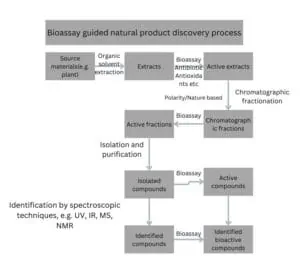What are the natural products?
Natural products are chemical compounds that are produced from a variety of natural sources, plants, microbes, and animals.
 [ez-toc]
[ez-toc]
Characteristics of natural products:
Two types of characteristics of natural products
- Chemical characteristics
- Biological characteristics
Chemical characteristics:
- Small organic compounds that occur in nature including heterocyclic compounds and peptides.
- And those which not included are proteins, carbohydrates, and nucleic acids.
- Molecular weight : approximately 150 < 800 a m u.
- The techniques of extraction and purification are largely comparable to those used for organic molecules. For example: TLC, column chromatography, HPLC, and GC.
- Techniques of structural determination like NMR, MS, IR, X-ray, and UV.
Biological characteristics:
- In general, compounds are features of a certain species or family. i.e., restricted taxonomic range.
- There is no structural or nutritional function.
- Color (identification), fragrance (attraction or repulsion), sexual attraction, social communication, and defense (e.g., plant poisons and antibiotics) are examples of functional roles.
- However, many functions remain undiscovered in their respective organisms.
- Classified as “secondary metabolites” as opposed to “primary metabolites.”
Metabolites:
Two types of metabolites.
- Primary Metabolites
- Secondary Metabolites
Primary Metabolites:
Primary metabolites are those metabolites which directly involved in the growth, development, and reproduction of an organism e.g. Carbohydrates, Vitamins, Amino acids, Proteins, and Lipids (fatty acids)
Secondary Metabolites:
Secondary metabolites are those metabolites that are not directly involved in the growth, development, and reproduction of an organism, but these have usually some ecological functions within the organisms e.g. Alkaloids, Flavonoids, Phenolics, Steroids, Terpenoids, and Glycosides.
Why do some but not all organisms produce secondary metabolites?
Some organisms produce secondary metabolites because their production acts as
- Competitive weapon against other microorganisms, plants, insects, and large animals.
- As transporting factors of metals
- Factors of plant-microbe symbiosis and plant growth stimulation
- Sexual hormones
- Differentiation.
Natural product discovery:
- At the end of the 18th century, crude drugs were discovered which are still being used as powders, simple extracts, or tinctures.
- 1803 is the era of pure compounds that were discovered, are used as drugs.
- Morphine is isolated from opium
- Strychnine was discovered in 1817
- Quinine and Caffeine were discovered in 1820
- Nicotine was discovered in 1828
- Atropine was discovered in 1833
- Cocaine was discovered in 1855
- In the 19th century, the chemical structures were determined by various isolated compounds
- In the 20th century, some imported drugs from the animal kingdom, especially hormones and vitamins were discovered.
- In the 20th century, some microorganisms were discovered as a source of drugs.
What is the role of natural products in drugs?
- Natural products provide beneficial drugs that are not synthesized synthetically.
- Natural sources give basic compounds which, on slight modification, become more effective and less toxic.
- Natural products are used as prototypes for the design of synthetic drugs which possess physiological activities.
What are the examples of drugs derived from natural products?
Some examples of drugs that are derived from natural products are given below:
- Aspirin is derived from willow tree bark
- Digoxin is derived from the Digitalis lanata flower
- Morphine is derived from opium
Bioassay-guided natural product discovery process
 FAQ:
FAQ:
Why are natural products attractive for natural drug discovery?
Metabolites identified in medicinal components and other natural items reduce the negative effects of manufactured medications. Natural products may not have any side effects. That’s the reason natural products are attractive for natural drug discovery.
How do you identify a natural product?
Anything that is produced by living organisms is a natural product, including biotic materials such as wood and silk, etc., bio-based materials such as bioplastics, cornstarch, etc., bodily fluids such as milk, plant exudates, and some other natural products that once occurred in living organismsuch as soil, coal, etc.